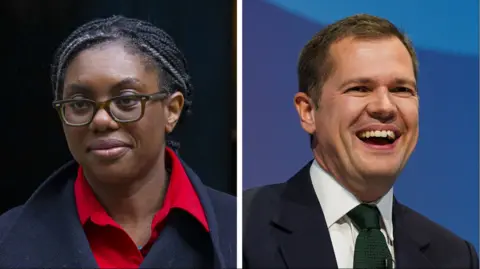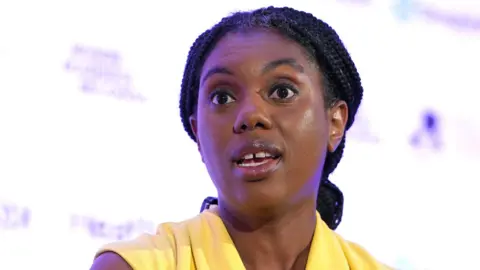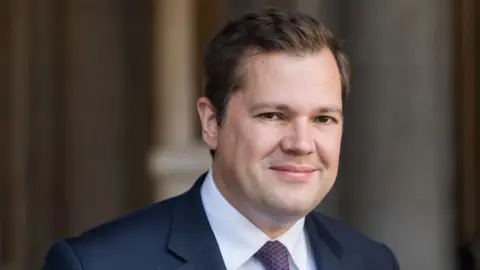Conservative leadership: Who are the candidates?
 Getty Images
Getty ImagesThe battle to take over from Rishi Sunak as leader of the Conservative Party has been whittled down to the final two.
Kemi Badenoch and Robert Jenrick remain in the contest, with James Cleverly - the previous frontrunner - knocked out.
MPs have now had their final say on which two candidates go through to the final vote. Party members will spend the second half of October choosing the ultimate winner, with the result announced on 2 November.
Kemi Badenoch
 PA Media
PA MediaBorn in London and raised in Nigeria, Olukemi Olufunto Adegoke became the Tory MP for Saffron Walden in 2017 under her married name Badenoch.
Known for her robust views and no-nonsense style, her political heroine growing up in Nigeria was Margaret Thatcher, according to Blue Ambition, a biography written by Tory peer Lord Ashcroft.
She returned to the UK at the age of 16 to study for her A-levels before gaining a masters degree in computer systems engineering from Sussex University.
She became more Conservative partly as "a reaction to the very spoiled, entitled, privileged, metropolitan elite-in-training at university," she told a Spectator podcast.
Before entering politics, the 44-year-old mother of three worked in IT and banking.
She held a series of ministerial jobs under Boris Johnson, Liz Truss and Rishi Sunak, who promoted her to business secretary.
But it is arguably through her other former role - as minister for women and equalities - that she has emerged as a darling of the modern Conservative right for her stance on trans rights.
She first ran for Conservative leader in 2022 following Johnson's resignation, and came fourth despite starting the race with a relatively low-profile.
Launching her latest bid, she said the Conservative Party needed to "stop acting like Labour" to win back power.
Robert Jenrick
 Getty Images
Getty ImagesRobert Jenrick has reinvented himself as a right-winger after beginning his political journey as a more centrist figure and a close ally of former PM Rishi Sunak.
In December 2023, he resigned his role as immigration minister, saying Sunak's emergency Rwanda legislation did not go far enough.
And he has since been outspoken about what he sees as his party's failure to deliver on its promises to cut immigration when it was in power.
In particular, he has led calls for the UK to withdraw from the European Convention on Human Rights.
This helped him attract support from MPs previously loyal to his former boss at the Home Office, Suella Braverman, who ruled herself out of the leadership contest before it began.
The 42-year-old father of three was a corporate lawyer - and a director of auction house Christie's - before entering politics as the MP for Newark in 2014.
His Tory leadership pitch is that the party needs to confront hard truths - and only he can make the changes needed to win the next election.
In 2020, he was embroiled in controversy over his decision as housing secretary to grant planning permission for a housing development in east London linked to a Tory donor.
In 2023, he made headlines again for ordering that murals of cartoon characters at a reception centre for child asylum seekers in Dover be painted over.
More recently, he admitted using the weight loss drug Ozempic, but said he "didn't particularly enjoy it" and went on to lose weight by more traditional means.
How does the Conservative leadership contest work?
Six contenders made the initial shortlist after gaining the support of at least 10 MPs.
On 4 September, Dame Priti Patel was the first would-be leader to be knocked out in a ballot of Tory MPs.
On 10 September, five became four when a second Tory MP vote knocked out Mel Stride.
The final four had a number of opportunities to speak directly to Conservative members at the party's conference in Birmingham, between 29 September and 2 October.
On 8 October, Tom Tugendhat was eliminated from the contest in the third round of MPs' voting, and James Cleverly knocked out the following day.
Badenoch and Jenrick will now face party members who will pick the winner.
How will the party membership vote work?
Party members will be able to cast their vote between 15 October and 31 October.
They will make their choice via a secure online voting system, though this approach has previously been criticised for its susceptibility to hackers and rogue state interference.
To be eligible to vote, party members must have been active for 90 days before the ballot closes, and to have been party members when nominations opened.
The new leader of the Conservative Party will be announced on 2 November - at which point Sunak will formally stand down.

Sign up for our Politics Essential newsletter to read top political analysis, gain insight from across the UK and stay up to speed with the big moments.
It’ll be delivered straight to your inbox every weekday.
